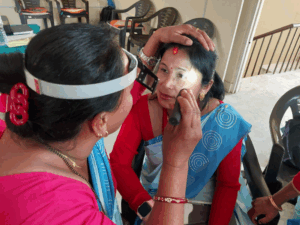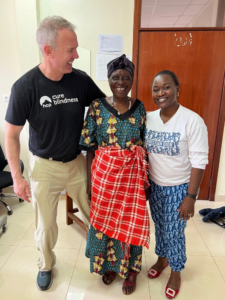
Cure Blindness Project, in collaboration with Sitapur Eye Hospital, is implementing the Blindness Prevention Program in India to reduce preventable blindness and improve access to quality eye care services in Sitapur district, Uttar Pradesh, India.
Published May 28, 2025 by Cure Blindness Project

Central to this effort are Accredited Social Health Activists (ASHAs)—dedicated Community Health Workers (CHWs) who are trained to screen for eye conditions, provide primary treatment for corneal abrasions, and refer patients for advanced care, including refractive errors and cataracts.
Initially launched in the Biswan, Laharpur, and Tambaur blocks of Sitapur, Uttar Pradesh, this model has already demonstrated remarkable impact: 97% of patients have been treated at the primary level by trained community health workers on corneal diseases, a recent Deloitte study estimated a 7.3x social return on investment, and communities are receiving faster care while developing greater trust in early intervention. Since program inception in India, our trained Community health workers have screened over 108,367 patients on different eye diseases and made 1,022 referrals for advanced care.
Building on this success, the program is now expanding to Bahraich (Naanpara block) and two additional blocks in Sitapur: Rampur Mathura and Mahmoodabad. As part of this expansion, 640 new Community Health Workers have recently been trained on comprehensive eye care which includes screening of several eye conditions, providing first aid for corneal abrasions and making referrals for advanced eye care. In partnership with Vision Spring we expanded our horizon to include Refractive error as part of the training curriculum and delivery.

These newly trained CHWs will now deliver comprehensive eye care services across the new blocks, ensuring more underserved communities gain access to timely, effective eye care.
To strengthen and sustain this effort, a refresher training will be conducted after six months, reinforcing skills and ensuring continued quality of care at the community level.
We are deeply grateful to Sitapur Eye Hospital and VisionSpring for their continued partnership as we work together to eliminate preventable blindness and make quality eye care accessible across Uttar Pradesh.
Related Articles

Cure Blindness Project Celebrates World Sight Day, and its 30th Anniversary
Cure Blindness Project has joined the international eye health community in marking World Sight Day on October 9. Celebrating its 30th anniversary, the organization is expanding programs across Asia and Africa.

A Legacy of Sight: Dr. John Downing’s Global Impact
Dr. John Downing, an ophthalmologist with over 60 years of experience, has dedicated his career to fighting preventable blindness worldwide through his work with Orbis International, training local doctors and funding vision centers in underserved regions.

Cure Blindness Project Volunteer Wins Humanitarian Award
Long-time Cure Blindness Project volunteer ophthalmologist Dr. Sam Cady received the 2024 Alumni Humanitarian Award at Upstate Medical University (Norton College of Medicine) as part of their September alumni celebrations.
